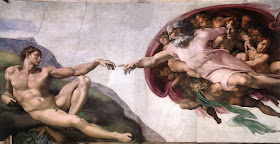"But grant that he departed with sin upon him, even on this account one ought to rejoice, that he was stopped short in his sins and added not to his iniquity; and help him as far as possible, not by tears, but by prayers and supplications and alms and offerings. For not unmeaningly have these things been devised, nor do we in vain make mention of the departed in the course of the divine mysteries, and approach God in their behalf, beseeching the Lamb Who is before us, Who takes away the sin of the world—not in vain, but that some refreshment may thereby ensue to them. Not in vain does he that stands by the altar cry out when the tremendous mysteries are celebrated, “For all that have fallen asleep in Christ, and for those who perform commemorations in their behalf.” For if there were no commemorations for them, these things would not have been spoken: since our service is not a mere stage show, God forbid! Yea, it is by the ordinance of the Spirit that these things are done.
"Let us then give them aid and perform commemoration for them. For if the children of Job were purged by the sacrifice of their father, why do you doubt that when we too offer for the departed, some consolation arises to them? Since God is wont to grant the petitions of those who ask for others. And this Paul signified saying, “that in a manifold Person your gift towards us bestowed by many may be acknowledged with thanksgiving on your behalf.” (2 Cor 1:11) Let us not then be weary in giving aid to the departed, both by offering on their behalf and obtaining prayers for them: for the common Expiation of the world is even before us. Therefore with boldness do we then intreat for the whole world, and name their names with those of martyrs, of confessors, of priests. For in truth one body are we all, though some members are more glorious than others; and it is possible from every source to gather pardon for them, from our prayers, from our gifts in their behalf, from those whose names are named with theirs. Why therefore do you grieve? Why mourn, when it is in your power to gather so much pardon for the departed?"
~St. John Chrysostom (Bishop of Constantinople): Homilies on First Corinthians, Homily 41, 8. (A.D. 392).
Byzantine Mosaic of John Chrysostom from the Hagia Sophia.

















